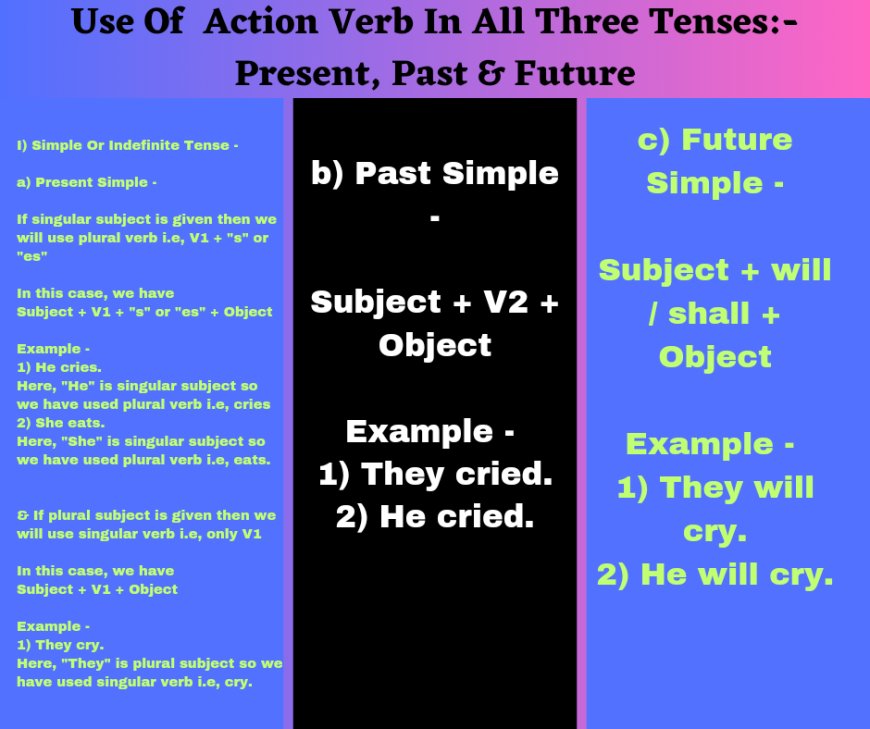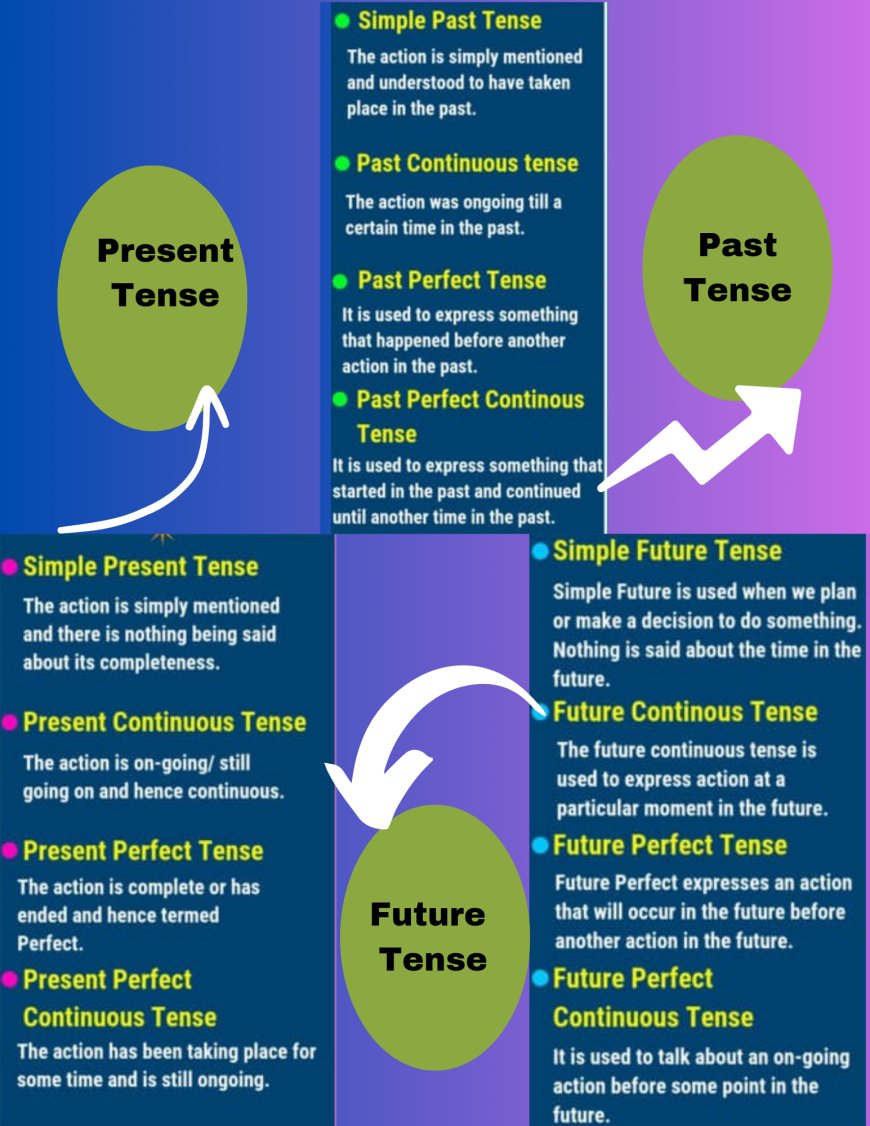Different Types Of Verb Action Verb Linking Verb Auxiliary Verb & Modal Verb
Different Types Of Verb - Action Verb Linking Verb Auxiliary Verb & Modal Verb
Action Verb -
An action verb is a verb in which an action or activity is performed to do or perform an action, meaning an action verb tells what the subject does.
एक action verb वह क्रिया होती है जिसमे किसी कार्य को करने या उसपे एक्शन या क्रियाकलाप की जाती हो मतलब एक action क्रिया शब्द बताता है की subject क्या करता है।
Use Of Action Verb In All Three Tenses:-
Present, Past & Future
Action क्रिया
तीनों काल में क्रिया का प्रयोग :-
वर्तमान, भूत और भविष्य
I) Simple Or Indefinite Tense -
a) Present Simple -
If singular subject is given then we will use plural verb i.e, V1 + "s" or "es"
In this case, we have
Subject + V1 + "s" or "es" + Object
Example -
1) He cries.
Here, "He" is singular subject so we have used plural verb i.e, cries
2) She eats.
Here, "She" is singular subject so we have used plural verb i.e, eats.
& If plural subject is given then we will use singular verb i.e, only V1
In this case, we have
Subject + V1 + Object
Example -
1) They cry.
Here, "They" is plural subject so we have used singular verb i.e, cry.
b) Past Simple -
Subject + V2 + Object
Example -
1) They cried.
2) He cried.
c) Future Simple -
Subject + will / shall + V1 + Object
Example -
1) They will cry.
2) He will cry.
Basic Level Of Questions-
(प्रश्नों का मूल स्तर-)
- Simple/Definite Present Tense -
- She drinks coffee every morning.
वह रोज सुबह कॉफी पीती है।
2. He teaches English at the university.
वह विश्वविद्यालय में अंग्रेजी पढ़ाते हैं।
3. The sun rises in the east.
सूरज पूरब में उगता है।
4. I walk to work every day.
मैं रोज़ काम पर जाता हूँ।
5. They play tennis on Saturdays.
वे शनिवार को टेनिस खेलते हैं।
6. We eat lunch at noon.
हम दोपहर का खाना खाते हैं।
7. The dog barks at strangers.
कुत्ता अजनबियों पर भौंकता है।
8. She sings in the choir.
वह गाना बजानेवालों में गाती है।
9. He works as a doctor.
वह एक डॉक्टर के रूप में काम करता है।
10. They watch TV in the evening.
वे शाम को टीवी देखते हैं।
11. I enjoy reading books.
मुझे किताबें पढ़ना अच्छा लगता है।
12. She listens to music while she works.
जब वह काम करती है तो वह संगीत सुनती है।
13. He plays the guitar very well.
वह गिटार बहुत अच्छा बजाता है।
14. The train arrives at 9am.
ट्रेन सुबह 9 बजे आती है।
15. We live in a big house.
हम एक बड़े घर में रहते हैं।
16. The baby cries when she's hungry.
भूख लगने पर बच्चा रोता है।
17. They dance at parties.
वे पार्टियों में डांस करते हैं।
18. She studies hard for her exams.
वह अपनी परीक्षाओं के लिए कड़ी मेहनत करती है।
19. He cooks dinner for his family.
वह अपने परिवार के लिए रात का खाना बनाता है।
20. We visit our grandparents every month.
हम हर महीने अपने दादा-दादी से मिलने जाते हैं ।
जब आप ऊपर दिए गए सभी वाक्यों को देखेंगे तो आप पाएंगे कि ऊपर दिए गए सभी सामान्य वर्तमान वाक्यों के अंत में ता है, ती है और ते है निश्चित है।
- Simple / Definite Past Tense-
1. She walked to the park yesterday.
वह कल पार्क में चली गई।
2. He studied hard for his exams last week.
उन्होंने पिछले सप्ताह अपनी परीक्षाओं के लिए कड़ी मेहनत की।
3. The sun set in the west yesterday.
कल सूरज पश्चिम में अस्त हुआ।
4. I ate breakfast at 8 AM this morning.
मैंने आज सुबह 8 बजे नाश्ता किया।
5. They played basketball yesterday afternoon.
उन्होंने कल दोपहर बास्केटबॉल खेला।
6. We watched a movie last night.
हमने कल रात एक फिल्म देखी।
7. The dog chased the cat yesterday.
कुत्ते ने कल बिल्ली का पीछा किया।
8. She sang a song at the concert last month.
उसने पिछले महीने संगीत कार्यक्रम में एक गाना गाया था।
9. He worked as a waiter during college.
उन्होंने कॉलेज के दौरान वेटर के रूप में काम किया।
10. They visited their grandparents last weekend.
वे पिछले सप्ताहांत अपने दादा-दादी से मिलने गए थे।
11. I finished reading the book yesterday.
मैंने कल किताब पढ़ना समाप्त कर दिया।
12. She listened to music while she cleaned her room.
जब उसने अपना कमरा साफ किया तो उसने संगीत सुना।
13. He played the piano at the recital last year.
उन्होंने पिछले साल गायन में पियानो बजाया था।
14. The train arrived late yesterday.
ट्रेन कल देर से आई।
15. We lived in a small apartment when we were young.
जब हम छोटे थे तब हम एक छोटे से अपार्टमेंट में रहते थे।
16. The baby slept for 10 hours last night.
बच्ची कल रात 10 घंटे सोई।
17. They danced at the wedding last Saturday.
उन्होंने बीते शनिवार को शादी में जमकर डांस किया।
18. She studied abroad for a year in college.
उसने कॉलेज में एक साल तक विदेश में पढ़ाई की।
19. He cooked dinner for his friends last night.
उसने कल रात अपने दोस्तों के लिए खाना बनाया।
20. We visited Paris last summer.
हमने पिछली गर्मियों में पेरिस का दौरा किया।
जब आप ऊपर दिए गए सभी वाक्यों को देखते हैं, तो आप पाएंगे कि ऊपर दिए गए सभी सरल पिछले वाक्यों का अंत या , यि और ये पर तय है , और थे,था, थी पर तय है।
- Simple/Definite Future Tense
- She will go to the gym tomorrow morning.वह कल सुबह जिम जाएगी।
- He will study hard for his final exams next month.वह अगले महीने अपनी अंतिम परीक्षा के लिए कड़ी मेहनत करेगा।
- The sun will rise in the east tomorrow.सूर्य कल पूर्व दिशा में उदय होगा।
- I will have dinner with my friends tonight.मैं आज रात अपने दोस्तों के साथ खाना खाऊंगा।
- They will play soccer next weekend.वे अगले सप्ताहांत में फ़ुटबॉल खेलेंगे।
- We will watch a movie together tomorrow night.हम कल रात एक साथ एक फिल्म देखेंगे।
- The dog will bark at the mailman tomorrow.कल डाकिया पर कुत्ता भौंकेगा।
- She will sing at the concert next week.वह अगले सप्ताह संगीत कार्यक्रम में गाएंगी।
- He will work as a lawyer after he graduates.स्नातक होने के बाद वह एक वकील के रूप में काम करेगा।
- They will travel to Europe next summer.वे अगली गर्मियों में यूरोप की यात्रा करेंगे।
- I will finish my work by the end of the day.मैं दिन के अंत तक अपना काम पूरा कर लूंगा।
- She will listen to music while she cleans her room.जब वह अपने कमरे की सफाई करेगी तब वह संगीत सुनेगी।
- He will play the guitar at the talent show next month.वह अगले महीने टैलेंट शो में गिटार बजाएंगे।
- The train will arrive on time tomorrow.ट्रेन कल समय पर पहुंचेगी।
- We will move to a new house next year.हम अगले साल एक नए घर में चले जाएंगे।
- The baby will sleep for 12 hours tonight.बच्चा आज रात को 12 घंटे सोएगा।
- They will dance at the party next Friday.वे अगले शुक्रवार को पार्टी में डांस करेंगे।
- She will study hard to get good grades in college.वह कॉलेज में अच्छे ग्रेड प्राप्त करने के लिए कठिन अध्ययन करेगी।
- He will cook dinner for his family tomorrow night.वह कल रात अपने परिवार के लिए रात का खाना बनाएगा।
- We will visit our relatives next month.हम अगले महीने अपने रिश्तेदारों से मिलने जाएंगे।
Note: In some of these sentences, the use of "will" is optional, as the future tense can also be expressed with the present tense or other auxiliary verbs.
नोट: इनमें से कुछ वाक्यों में, "इच्छा" का उपयोग वैकल्पिक है, क्योंकि भविष्य काल को वर्तमान काल या अन्य सहायक क्रियाओं के साथ भी व्यक्त किया जा सकता है।
जब आप ऊपर दिए गए सभी वाक्यों को देखेंगे तो आप पाएंगे कि ऊपर दिए गए सभी सामान्य भविष्यवाणिय वाक्यों का अंत गा है, गे है और गी है पर निश्चित है।
........................................................................................
Now, in the next article I will ask competitive level question and I will explain in depth how we can use Simple Present, Simple Past, Simple Future while writing the sentence.
अब, अगले लेख में मैं प्रतियोगी स्तर के प्रश्न पूछूंगा और मैं गहराई से समझाऊंगा कि वाक्य लिखते समय हम सिंपल प्रेजेंट, सिंपल पास्ट, सिंपल फ्यूचर का उपयोग कैसे कर सकते हैं।
What's Your Reaction?
























































